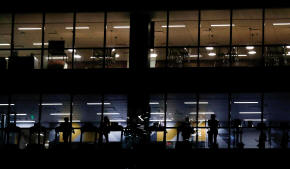Sick again, Argentine's economy eats away at nation's mental health
-study
 Send a link to a friend
Send a link to a friend
 [August 11, 2022]
By Lucila Sigal [August 11, 2022]
By Lucila Sigal
BUENOS AIRES (Reuters) - Argentines mired
in their country's latest economic meltdown are experiencing a growing
sense of hopelessness, according to a landmark mental health study that
points to boom times for at least one profession: psychologists.
Beset by soaring inflation that depresses livelihoods as the peso
currency steadily declines, the dysfunctional economy is wreaking havoc
on the population's state of mind as well as its wallets.
That's the conclusion of a survey by Buenos Aires University's (UBA)
applied psychology department, which found that upwards of 85% of 1,700
respondents think the present crisis has made them less hopeful for the
future, with half describing the change as significant or drastic.
Blessed with rich natural resources, the South American country has
nevertheless lurched from one crisis to another for much of its 200-plus
years since independence, progressively helping fuel demand for mental
health care, which is generally accessible through public hospitals.

According to pre-pandemic data from the World Health Organization,
Argentina had 222 psychologists per 100,000 residents, compared with 49
in France and 30 in the United States.
"The constant cycle of crisis has filled up so many doctor's offices,"
said Gustavo Gonzalez, head of the UBA's applied psychology department.
"Things are bad, and in some ways, worse in terms of mental health."
The UBA poll showed the most used terms by respondents to describe their
current state of mind were "anguish," "fed up," "angry" and - the single
most used term among 18-29 year-olds - "fear for the future."
[to top of second column]
|

People exercise inside an office
building, in Buenos Aires, Argentina August 9, 2022. REUTERS/Agustin
Marcarian
 Nearly 90% said they thought their
economic circumstances would worsen over the next year.
President Alberto Fernandez has sought to stop the
economic rot with measures including giving his latest economy
minister, Sergio Massa, expanded powers over trade, industrial and
agricultural policy.
Meanwhile, the ranks of the poor have swollen to almost 40% of the
population.
UBA's Gonzalez said the present turmoil was contributing to a
"psychological saturation" for those most affected, as too many
emotionally exhausted people essentially gave up on the possibility
of a brighter future.
"The average Argentine can't seem to find the light at the end of
the tunnel, and they obviously hold the government responsible," he
said, potentially bad news for Fernandez's ruling center-left
Peronists when the country hold elections next year.
"It's like a curse that eternally returns."
(Reporting by Lucila Sigal; Additional reporting by Belen Liotti;
Writing by David Alire Garcia; Editing by John Stonestreet)
[© 2022 Thomson Reuters. All rights
reserved.] This material may not be published,
broadcast, rewritten or redistributed.
Thompson Reuters is solely responsible for this content.
 |